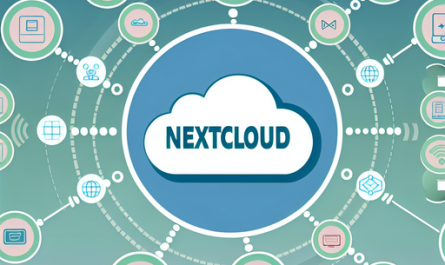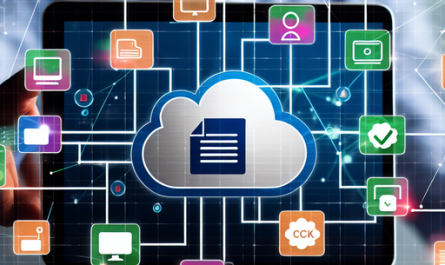Nextcloud and ConvergeHub: A Powerful Duo for Business Productivity
In today’s fast-paced digital age, businesses rely heavily on technology to streamline operations, enhance collaboration, and improve productivity. Two key players in this arena are Nextcloud and ConvergeHub. By leveraging the unique strengths of both platforms, companies can achieve a synergy that significantly boosts their efficiency. This article explores the integration of Nextcloud with ConvergeHub, highlighting the benefits and features of this powerful combination.
What is Nextcloud?
Nextcloud is an open-source, self-hosted file share and communication platform. It allows businesses and individuals to maintain complete control over their data by hosting it on their own servers. Nextcloud offers a range of features such as file sharing, calendar synchronization, contact management, collaborative document editing, and more. It is designed to provide secure and easy access to data from any device, anywhere, enhancing collaboration and productivity across teams.
Get Nextcloud with 1 TB of storage for just up to €3.99 per month.
Try it now for one month free and risk-free.
Introducing ConvergeHub
ConvergeHub is a comprehensive Customer Relationship Management (CRM) solution designed for small to medium-sized businesses. It integrates essential business functions like sales, marketing, customer service, and project management into one platform. ConvergeHub offers robust features including contact management, lead tracking, email marketing, and workflow automation. Its user-friendly interface and powerful tools make it an ideal choice for businesses looking to streamline their operations and improve customer relationships.
Why Integrate Nextcloud with ConvergeHub?
Integrating Nextcloud with ConvergeHub brings a multitude of benefits to businesses. By combining the secure file sharing and collaboration features of Nextcloud with the CRM capabilities of ConvergeHub, companies can enhance their overall productivity, streamline workflows, and improve customer engagement. Here are some key benefits of this integration:
- Enhanced Collaboration: With Nextcloud, teams can collaborate on documents in real-time, share files securely, and manage projects efficiently. When integrated with ConvergeHub, these collaborative efforts can be directly linked to customer records, ensuring that all relevant information is centralized and easily accessible.
- Streamlined Workflows: The integration allows businesses to automate various workflows. For example, files uploaded to Nextcloud can be automatically linked to specific leads or customer records in ConvergeHub, reducing manual data entry and minimizing errors.
- Improved Data Security: Nextcloud’s self-hosted environment ensures that sensitive data remains under the company’s control. This is particularly important for businesses that need to comply with data protection regulations. ConvergeHub’s integration with Nextcloud ensures that customer data is securely managed across both platforms.
- Centralized Data Management: The integration creates a unified system where all customer interactions, documents, and communications are stored in one place. This centralization simplifies data management and provides a comprehensive view of each customer, enabling better decision-making and more personalized customer service.
- Increased Efficiency: By eliminating the need to switch between multiple applications, employees can work more efficiently. The seamless integration of Nextcloud and ConvergeHub reduces the time spent on administrative tasks, allowing employees to focus on more strategic activities.
Key Features of Nextcloud and ConvergeHub Integration
The integration of Nextcloud with ConvergeHub offers several key features that enhance business operations:
1. Real-Time Document Collaboration
Nextcloud’s collaborative document editing feature allows multiple team members to work on the same document simultaneously. With ConvergeHub integration, these documents can be associated with specific customer records, ensuring that all relevant information is easily accessible and up-to-date.
2. Automated File Management
By integrating Nextcloud with ConvergeHub, businesses can automate file management processes. For example, documents uploaded to Nextcloud can be automatically linked to specific deals or projects in ConvergeHub, ensuring that all relevant files are organized and easily accessible.
3. Secure File Sharing
Nextcloud offers secure file sharing options, allowing businesses to share sensitive documents with external partners or customers. The integration with ConvergeHub ensures that these shared files are tracked and linked to the appropriate customer records, providing a comprehensive view of all interactions.
4. Centralized Customer Data
With the integration, all customer-related documents, communications, and interactions are stored in one centralized location. This ensures that employees have access to the most up-to-date information, enabling them to provide more personalized and efficient customer service.
5. Workflow Automation
The integration allows businesses to automate various workflows, reducing manual data entry and minimizing errors. For example, when a new lead is added in ConvergeHub, an automated workflow can create a folder in Nextcloud to store all related documents, streamlining the document management process.
How to Integrate Nextcloud with ConvergeHub
Integrating Nextcloud with ConvergeHub is a straightforward process. Here are the steps to follow:
Step 1: Set Up Nextcloud
If you haven’t already done so, you’ll need to set up a Nextcloud instance. You can either host Nextcloud on your own servers or use a cloud hosting provider. Follow the installation instructions provided on the Nextcloud website to get started.
Step 2: Configure Nextcloud
Once Nextcloud is set up, configure it according to your business requirements. Set up user accounts, create folders for document storage, and configure access permissions to ensure that only authorized users can access sensitive information.
Step 3: Set Up ConvergeHub
If you haven’t already done so, sign up for a ConvergeHub account. Follow the setup instructions provided on the ConvergeHub website to configure your account and set up your business processes.
Step 4: Integrate Nextcloud with ConvergeHub
To integrate Nextcloud with ConvergeHub, you’ll need to use the APIs provided by both platforms. Follow the integration guide provided by ConvergeHub to connect your Nextcloud instance with your ConvergeHub account. This will typically involve configuring API keys and setting up webhooks to ensure that data is synchronized between the two platforms.
Step 5: Test the Integration
Once the integration is set up, test it to ensure that everything is working correctly. Upload a document to Nextcloud and verify that it is automatically linked to the appropriate customer record in ConvergeHub. Test various workflows to ensure that data is being synchronized correctly and that all automated processes are functioning as expected.
Best Practices for Using Nextcloud and ConvergeHub
To get the most out of the Nextcloud and ConvergeHub integration, follow these best practices:
1. Regularly Back Up Your Data
Ensure that both your Nextcloud and ConvergeHub data are regularly backed up to prevent data loss. Implement a robust backup strategy that includes both automated backups and manual backup checks.
2. Train Your Team
Provide comprehensive training to your team on how to use the integrated Nextcloud and ConvergeHub platform. Ensure that they understand how to upload documents, use collaborative editing features, and navigate the integrated system effectively.
3. Monitor and Optimize Workflows
Regularly review your workflows to identify any bottlenecks or inefficiencies. Use the data and insights provided by ConvergeHub to optimize your processes and improve overall efficiency.
4. Maintain Data Security
Ensure that your Nextcloud instance is secure and that access permissions are properly configured. Regularly review your security settings and update them as needed to protect sensitive information.
5. Stay Up-to-Date
Keep your Nextcloud and ConvergeHub instances up-to-date with the latest versions. Regular updates ensure that you have access to the latest features and security enhancements, improving the overall performance and security of your integrated system.
Conclusion
Integrating Nextcloud with ConvergeHub provides businesses with a powerful tool to enhance productivity, streamline workflows, and improve customer engagement. By combining the secure file sharing and collaboration features of Nextcloud with the CRM capabilities of ConvergeHub, companies can create a unified system that simplifies data management and enhances overall efficiency. Follow the steps and best practices outlined in this article to successfully integrate Nextcloud with ConvergeHub and unlock the full potential of this powerful combination.
Whether you’re a small business looking to improve customer relationships or a larger organization aiming to streamline operations, the integration of Nextcloud and ConvergeHub offers a comprehensive solution that caters to your needs. Embrace this integration and take your business productivity to new heights.



